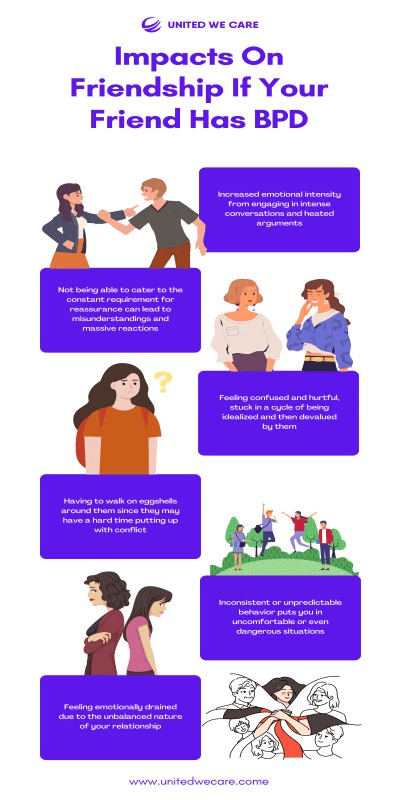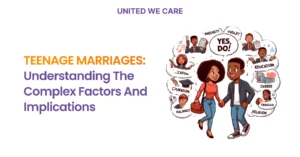Introduction
Imagine this: you’re surfing in the ocean of life, with your emotions being the tidal waves. One minute, you’re riding the waves high, and the next, you’re thrown underwater. You make an effort to get back up again, only for the wave to knock you out soon enough. Life with Borderline Personality Disorder (BPD) can feel similar—you’re always on edge.
A person with BPD struggles to regulate their emotions, acts impulsively and irrationally, and has an unstable self-image, which affects their relationships.
Navigating a friendship with a person with BPD can feel distressing. On one hand, you see a loved one suffering, and on the other hand, you need to protect yourself from the off-balance dynamics.
Signs that your friend has borderline personality disorder
When you’re close to someone, their level of well-being can affect the kind of relationship you have with them.
This means that if your friend is suffering from BPD, it can pose some challenges for you, such as constant tension, confusion, or helplessness.
While BPD may not always be easy to recognize, looking out for these signs in your friend can help navigate the relationship better:
- Shifting between extremes: labeling people, things, or situations as all good or all bad, leaving no room for a middle ground
- Intense and unstable relationships: A pattern of idealizing and devaluing people results in tumultuous relationships
- Intense, inappropriate, and uncontrolled fits of rage
- Distorted and unstable self-image: feeling fundamentally flawed or worthless, leading to frequent changes in goals, values, and identity
- Fear of abandonment: whether real or imagined, this fear pushes them to become overly dependent and clingy by constantly seeking reassurance and attention
- Impulsive behavior: binge eating, overspending, reckless driving, substance abuse, self-harm actions, etc.
- Dissociation: Prolonged periods of feeling spaced out where they feel disconnected from their thoughts, feelings, and surroundings [1]
Understanding these aspects of BPD can help give context to the way a person with BPD thinks, feels, behaves, and reacts. It’s the first step to creating and maintaining a healthy relationship with your friend.
Having a friend with borderline personality disorder: Impacts on friendship
Every relationship comes with its own set of challenges, and having a friend with BPD is no different. Some ways our friendship with them may be impacted are:
- Increased emotional intensity from engaging in intense conversations and heated arguments
- Not being able to cater to the constant requirement for reassurance can lead to misunderstandings and massive reactions
- Feeling confused and hurtful, stuck in a cycle of being idealized and then devalued by them
- Having to walk on eggshells around them since they may have a hard time putting up with conflict
- Inconsistent or unpredictable behavior puts you in uncomfortable or even dangerous situations
- Feeling emotionally drained due to the unbalanced nature of your relationship [2]

A person with BPD may lack an understanding of mutuality in friendship. Hence, they might expect their friends to take care of them. This can create dysfunction in the relationship and eventually lead to the collapse of the friendship.
Hence, a person with BPD needs to seek treatment to help them better regulate their emotions. This can also help them communicate their symptoms and struggles with more clarity to their loved ones.
How to support a friend with borderline personality disorder
Depending on how your friend experiences BPD, you can offer different types and levels of support, such as:
- Learning about BPD: Understanding what they’re going through can help you empathize with their struggles and reduce stigma
- Listening actively and letting them know their feelings are valid and that you care about them
- Communicating clearly and setting boundaries: Being clear and concise as to what is and is not okay for you in this friendship. Leaving no room for ambiguity to protect their and your wellbeing
- Encouraging professional help: Without pressuring or criticizing them, help them look for therapists and treatment options that they may benefit from [3]
- Staying calm when conflicts arise not to escalate an intense situation
- Engaging in different, fun experiences to offer healthy distraction while they’re navigating through intense emotions
- Not taking it personally if and when they need their space and alone time
- Practicing self-care and seeking support for yourself to help manage the stress and challenges in your friendship
Having a friend with BPD can be a balancing act between supporting them and your own needs. With deeper understanding and patience, it is possible to maintain a healthy friendship.
How to help a friend with borderline personality disorder who refuses to take treatment
It can be painful to watch a friend refuse to get the treatment they deserve to feel better. In this case, it may be better to let them take their own time to come around rather than forcing them.
It may help to acknowledge their resistance and gently express your concern. At all times, be open and non-judgemental.
Try to understand what is worrying them about seeking treatment, and offer emotional support and encouragement.
Remind them that you’re there for them whenever they decide to seek help. Ask them what other kind of practical help they feel they require to feel better. [4]
And lastly, move past the guilt and despair if they’re not ready to get treatment yet. Remember, you’re doing your best, and take care of yourself.
In conclusion
Life with BPD is full of its highs and lows, and so is the friendship with a person suffering from it. However, it doesn’t always have to be like that.
By understanding the symptoms of BPD, it becomes possible to manage its impact on your friendship. A person with BPD needs to acknowledge their condition and seek support and treatment to get better. Together, it is possible to create a healthy and balanced friendship.
There are some things you can personally do to actively support your friend with BPD, like validating their experience and communicating clearly. Encouraging them to get professional help is of paramount importance.
Sometimes, your friend with BPD may not be ready to seek treatment right away. This is your chance to be there for them without judgment or pressuring them.
It is crucial to take care of yourself as you support your friend on their BPD journey.
If you find similar signs in yourself or a loved one , you need to reach out for professional support. The United We Care app can be a useful resource in getting suitable support.
References:
[1] “Borderline Personality Disorder,” National Alliance on Mental Illness (NAMI), https://www.nami.org/About-Mental-Illness/Mental-Health-Conditions/Borderline-Personality-Disorder. [Accessed: Sep. 25, 2023].
[2] “Friendship with Someone with Borderline Personality Disorder (BPD),” Group Therapy, https://www.grouporttherapy.com/blog/friend-borderline-personality-disorder. [Accessed: Sep. 25, 2023].
[3] Stephanie Capecchi, LCSW, “How to Help Someone with BPD,” Choosing Therapy, https://www.choosingtherapy.com/how-to-help-someone-with-bpd/. [Accessed: Sep. 25, 2023].
[4] “Helping Someone with BPD,” Your Health in Mind, https://www.yourhealthinmind.org/mental-illnesses-disorders/bpd/helping-someone. [Accessed: Sep. 25, 2023].









